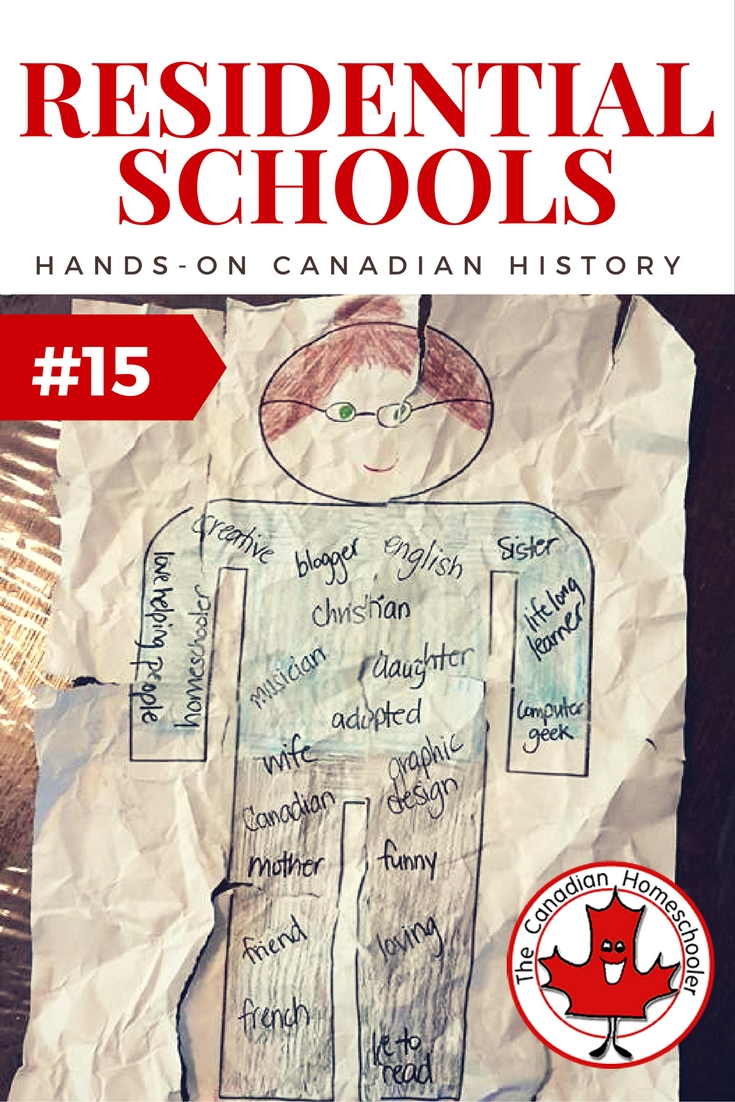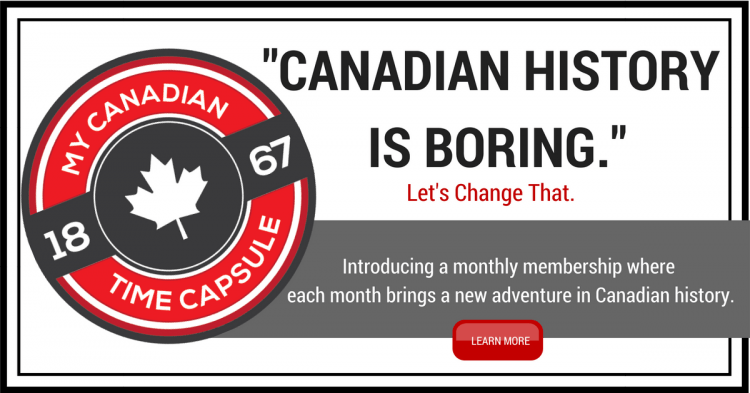One of the darkest parts of Canadian history is the use of residential schools for native children. Youngsters were removed from their families and homes, forced to wear European style clothing, had their braids cut off, punished for speaking their native language and required to become “civilized.” Children were seriously abused and mistreated. Shockingly, the last residential school didn’t close until the 1990s! The lasting effects of this 100 years of removing children from the cultural and traditional heritage have left the First Nations communities struggling to find, claim, and celebrate their identities, languages, and history.

My Identity Activity
Residential schools were typically horrible, abusive, and destructive places to live. Children had to give up all the things that made their identity and were expected to conform to a set of rules, beliefs, and systems that weren’t theirs. It is incredibly hard to keep a sense of self in a place that won’t let you be you.
The picture above is me. It shows all the things that make me be me. But something isn’t right with this picture…. Let’s talk about it.
Print out a copy of the person outline. Inside the body write down all the words that describe you. Think about what you are to your family and friends – a daughter/son, a brother/sister, etc. What do you believe in? What languages do you speak? What is your cultural history? What are you good at? What do you like to do? After you’ve filled up your person with words about you – colour the person to look like you.
Instruct your child to do the following:
Inside the body write down all the words that describe you. Think about what you are to your family and friends – a daughter/son, a brother/sister, etc. What do you believe in? What languages do you speak? What is your cultural history? What are you good at? What do you like to do? After you’ve filled up your person with words about you – colour the person to look like you.
Now, either take their paper (or have them do this themselves).
Imagine you’ve been taken from your family now and sent away to residential school. Everything about you is no longer allowed. All the things you are good at, all the things you are to other people is not true anymore because you aren’t allowed to be with your family and friends, all the things you believe are forbidden, and you can’t even speak your language anymore.
First, crumble the paper up into a tight ball, then open it up. Rip the page into pieces (but not too small because you will have to put it back together!) Hand it back to your child with a roll of tape. Can they put it back together?
Talk about how that person they are taping together can never be the same again. They are damaged and broken. All the things that made them special and unique and themselves are destroyed. Would it be hard to figure out who you were again if this happened? What if this had happened to you and all your friends? Would you be able to go back to being your old selves ever again?
Discuss ways that someone who didn’t have this happen could help. How can you support someone who is this damaged?
Want to read some books on reconciliation? Here is a list of 10 books about residential schools to read with your kids.
See all 31 Days of Hands-on Canadian History.
- How to Keep a Toddler Busy While Homeschooling - March 21, 2024
- 25+ Things Your Kids Learn From Video Games - March 20, 2024
- 10 Words For New Homeschoolers - March 20, 2024



I like this idea! The only hesitation that I would have is that it doesn’t give the side of hope. I wouldn’t want them to think that if they ever experience something really traumatic that they will never be the same so they might as well give up. Just pondering how to balance the idea of not wanting to hurt anyone else or yourself (prevention) vs putting yourself back together (survivor vs victim). Thanks so much for this series! You’ve given me some great ideas for when I plan our next Canadian history unit!
When I say “them”, I mean my kids.
Thanks for the feedback. This is why the whole topic of residential schools is so incredibly challenging. It isn’t a story of hope. It’s a story of destruction. And it’s painful to deal with. I think the important thing to note is that this person IS back together, but they will never be exactly the same. I don’t think that this is necessarily a message of hopelessness, but it is the truth. You AREN’T the same. You are changed.
Such a hard topic.
I agree with you completely. I teach Indigenous children and am Indigenous myself. I think this is one of the few lessons I’ve read/heard about that even begins to scratch the surface. Well done!
Thank you, Renee. 🙂
Did you know that there is a book within the Dear Canada Series that is about residential school as well? It is brand new.
I just heard about it! Thanks for sharing.
On another note – we have friends who are missionary on Manitoulin Island, ON and they have told us that the residential schools have affected the relationship and the trust between Natives and white/government people. Unfortunately, the grandparents/parents of current youth have often reticent in the mission work done on the island because of the residential school. It has affected families to numerous generations and still to this day affect relationships. It is very sad and we need to be more aware of what has been done to these people. Reminds me of the Orphans of Duplessis (kids born out of wedlock in the 40s in Quebec which is somewhat similar situation).
So sad 🙁
Thank you for this graphic depiction of the incredible damage done by the Residential Schools. I was 12 years old and living in Winnipeg during the “60’s scoop”. I was horrified by the things that I saw happening to Indigenous children in the North-east neighborhood, where most of them lived — in abject squalor. What I didn’t understand at the time is that their parents, grandparents, and great-grandparents had all gone through the Residential Schools program — which essentially, was an attempt at ‘cultural genocide’! I remember feeling so badly for those children who were wandering the streets — either, looking for one of their (drunken, or ‘high’) parents; or begging for food — or for money. While I never experienced that level of desperation; I, nevertheless, have always ‘identified myself’ with those Indigenous children. I, too, grew up with an ‘alcoholic’ mother and a ‘physically violent’ father — which was ‘traumatizing’.
I never really understood why indigenous children act the way they do. Now, I know it’s due to residential schools. There’s a long line of pain and hurt passed down from generation to generation.
Thank you so much for this! I shared it with two of my colleagues today. They agreed with me that you had a great idea! Merci beaucoup!
As a poor white guy being brought up in those days, if I was a bad actor the provincial government would take me away and put me in a reform school or an orphanage for people that need an attitude adjustment. “Away from my family” Today that treatment would be considered a form of torture.
Smoking weed back they were taboo and you go to jail if caught, today it’s legal.
I forever hear about the residential schools and the atrocities that happen then, it was no different for bad actor white guys. But the past is the past, history, LET’S LEARN BY IT AND MOVE ON. As long as we live in the past we will not be able to move forward.
Don’t get me wrong I’m NOT downplaying the problem, but it was … back then,
It wasn’t just “back then.” Did you know that the last Resident School in Canada didn’t close until 1996?
Also, it wasn’t just a single bad actor white guy (which I don’t really understand.) It was entire generations of children from many indigenous tribes with the blatant intention of wiping out their cultures. It wasn’t just “sending them to reform school for being bad.”
For 100 years, children from Indigenous families were stolen from their family, forced to give up their languages and heritage and beliefs, and suffered sexual, physical, emotional, and mental abuse at the hands of people who thought they were better that those in their care. These actions have severely impacted the Indigenous communities today – as they struggle to reclaim their history and languages, and deal with the generational aftermath of PTSD.
Yes, we need to learn. But we also need to accept it happened and figure out how we can help move forward with compassion and understanding.
In my opinion, residential schools shouldn’t have been a thing. all the cruelty that those kids went through is not right, it doesn’t matter who you are.
I am a grade 1/2 teacher and this is the best lesson and a very powerful one that I think could really help to teach my students what Orange Shirt Day is about. For my students who can’t really write yet I would have them draw pictures inside the outline of themselves. Thanks for creating such an incredible moving and interactive lesson.
Yes, I agrees that we should help them move forward with compassion and understanding. The last week I have read and heard of all the horrible actions that have impacted the aboriginal communities even today. It is a really bad episode in our history and cannot be changed, but we can help diminish the loss and pain that the indigenous people have to bare.
The Residential schools are only one way to change identity and discrimination to people in my opinion school is a place to learn new things not learn different thing that change you and your life. People should have all been treated the same. We are not forced to go to school but back then there was a hunter that came to get your kids if you had any at the school age.. It seems that they were not only forced to go to school but they were abused there and some of the schools didn’t even give you a name they gave you a number instead. It is very merciless to what the children went through.. Nobody should have to go through that. Even in English school we learn a new language but we never have to dress in English clothes and change our identity and culture but we do have to speak English since we are in English school.
these residential schools were very wrong like how can another human do something like that to another especially to a child the only thing I can think of is they were possessed by the devil not teaching about Jesus.
I totally agree, i mean how can you even “think about” treating innocent children like that??……They were only thinking about themselves and mistreating the other people’s children to the point where they were suffering physical and emotional abuse but if it came to their children they would do everything possible to protect them.